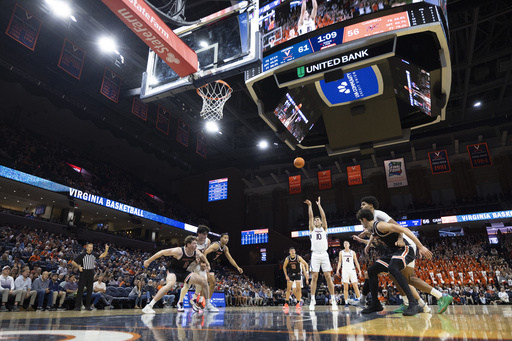
After five consecutive Marches ended without a victory in the NCAA Tournament, the Virginia basketball program decided it was time for a change. However, rather than simply modifying a few strategies, the entire landscape shifted dramatically.
At the introduction of interim coach Ron Sanchez in October, he remarked, “It’s unprecedented for us to be here.” “But we are.” Those words reflected a Virginia basketball program that was grappling with the absence of its longstanding coach, Tony Bennett, alongside the implementation of a more free-flowing offensive approach and the integration of a roster significantly influenced by transfers.
With a current record of 5-2, the Cavaliers displayed glimpses of promise by winning their initial three games under Sanchez against less competitive teams, such as Campbell and Coppin State, as well as a struggling Villanova. However, a foray into the Baha Mar tournament in the Bahamas revealed challenges through losses to ranked teams, No. 11 Tennessee and No. 22 St. John’s.
Junior guard Isaac McKneely noted the youth of the team, stating, “We’ve got a lot of guys new to the system, and it’s early in the season, so I’m hoping by January, February we’ll have it figured out.” The Cavaliers were gearing up for their first true road game against No. 13 Florida as part of the ACC/SEC Challenge, continuing to define their identity.
Leading up to Bennett’s unexpected retirement, the team was already in a period of transition, refreshing its roster with four new scholarship transfers and attempting to reshape their offensive strategy to become less predictable. Bennett, who guided the Cavaliers to significant heights, including an NCAA championship in 2019, left due to frustrations with college basketball’s evolving landscape, especially concerning NIL and transfer portal pressures.
The abrupt change left UVA with little choice but to continue on, promoting Sanchez from within and allowing Bennett’s prior staff the opportunity to demonstrate their worth this season. Manhattan coach John Gallagher remarked on the uncertainty faced by many teams in November, emphasizing that the journey is more crucial than the current standing.
Sanchez has been navigating the process of molding the team’s composition through trial and error to construct a lineup that is both cohesive and effective. Recently, he has opted for a three-guard starting lineup featuring McKneely, Andrew Rohde, and Dai Dai Ames.
“I think we’re settling into where we are right now,” said Sanchez after a victory over Holy Cross. The adjustment to having more ball handlers on the floor has made a noticeable impact, helping the Cavaliers significantly reduce turnovers, down from 18 against Tennessee to six against Holy Cross.
Nonetheless, it’s worth noting that these improvements have coincided with facing opponents of varying strength, and the upcoming matchup against Florida, led by assertive guard Will Richard, will pose a considerable challenge.
Bennett’s legacy includes a remarkable 364-136 record over a span of 15 seasons, which was primarily built on a staunch defensive approach. His signature pack-line defense, influenced by his father’s coaching style, turned Virginia into an ACC powerhouse.
Sanchez, who has extensive experience under both Bennett coaches, maintains a commitment to this defensive philosophy, although transitioning and executing it at a high level remains challenging for the players.
Previously, Virginia’s elite defenders created a formidable presence on the court, but the loss of key players like Florida State transfer Jalen Warley has created gaps, particularly in perimeter defense.
While Bennett’s defensive strategies were his hallmark, his offensive approach often came under scrutiny for its slower pace, emphasizing meticulous shot selection. In recent years, Virginia’s offensive effectiveness waned, leading Sanchez and the coaching staff to revamp their game plan to quicken the pace and provide players with more opportunities to exploit defensive mismatches.
Even with these modifications, Virginia still plays at the slowest tempo among major conference teams and has struggled to establish a dominant inside presence, often relying heavily on 3-point shooting. The stats reflect an average of 21.7 attempts per game and 8.4 makes, an increase from last season.
Sanchez hopes the three-guard formation will facilitate a more dynamic offensive strategy and has expressed enthusiasm for the skills of Elijah Saunders, a transfer from San Diego State. “Elijah’s three-level scoring is really important to the future of this season,” Sanchez acknowledged.
Last Friday, in an emotional return to watch a game for the first time since his retirement, Bennett observed the Cavaliers’ win over Holy Cross. He remained engaged, reacting to key plays and errors from his post in a suite.
Sanchez mirrored this enthusiasm on the bench, utilizing every moment to impart valuable lessons to his players. “I talk a lot about shared experiences,” he shared, emphasizing the need to endure challenges to develop and improve as a team. “This tough road is required for growth.”
